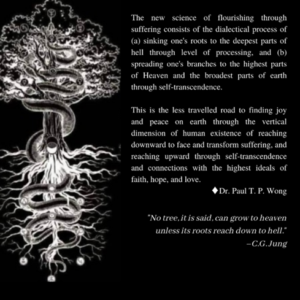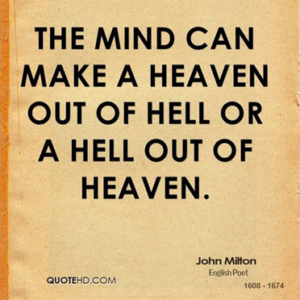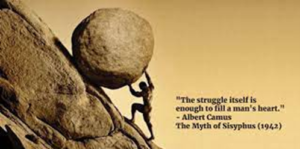Abstract
This paper invites you to consider a more adaptive view towards happiness and suffering which may change your life. It suggests that the old paradigm of seeking pleasure and avoiding pain is no longer adequate in the current digital age, and a new paradigm of embracing and transforming suffering is needed in order to achieve mature happiness, even in trying times. More specifically, I propose that a comprehensive understanding of happiness and suffering needs to encompass the following four ideas: (1) it is more adaptive to accept suffering as an inevitable part of life, (2) one needs to go through hell in order to reach heaven, (3) existential intelligence, also known as life intelligence (LQ), is needed for living a good life in turbulent times, and (4) a reorientation of value and life attitude begins with the “Aha!” moment of Sisyphus.
Man is born broken. He lives by mending. The grace of God is glue.
– Eugene O’Neill, Thirst, 2007
Everyone wants to be happy, but so few are truly happy people. Why is it so difficult to find happiness? Perhaps the following questions help you understand the scope of the issues you have to deal with:
- Do you know anyone who is not struggling with some concerns, such as health, money, or relationships?
- How often do you experience the inner moral struggle of doing the right thing?
- How often are you tormented by shame and guilt for violating your own conscience?
- Do you have any secret sorrows or hidden wounds?
- Do you know what you really want in order to be happy?
- Are you troubled by your inner critic and self-doubts?
- Do you know how to be free from your negative thoughts and emotions?
- Have you found out the best way to live your life?
- Do you remember the times when you were truly carefree and happy?
- Are you tired of having to deal with selfish and fake people?
- Do you have a soulmate who truly understands you and cares for you the way you are?
- Do you know of any workplace which is free from toxic people?
- Is it possible to be free from all the people or things that bother us?
- Where can we find a sanctuary where we feel safe and fully accepted?
- Is it possible to have a sense of control when facing the existential threats of the pandemic, climate change, and the prospect of nuclear war?
The above litany of woes indicate that we may be broken people living in a broken world and we have to contend with all kinds of internal and external problems which we have little control over. No wonder it is so difficult to find the liberation we need to live a happy life. The Korean drama, My Liberation Notes, portrays several ordinary people who are struggling with their personal problems. At the end, they are able to find some promise of liberation and happiness, but not in the way they had expected (Conran, 2022).

In this brief paper, I will present my answer to this persistent question about happiness based on my decades of research. There are four parts to my answer:
- Life is full of suffering; you just have to accept it.
- You need to go through hell before you can reach heaven.
- Cognitive intelligence (IQ) and emotional intelligence (EQ) are not enough; you also need life intelligence (LQ)
- Enlightenment and the “Aha!” moment of Sisyphus
It may be rewarding for you to find out why these conclusions are supported by both research and real-life examples.
Life is Full of Suffering
It does not matter whether we look at our own lives, at other people’s lives, or at the world stage: we cannot get away from the reality of suffering. This is not just my personal negative bias because I was a war baby growing up under Japanese occupation. We all have a negativity bias because it was selected by evolution for our survival (Baumeister et al., 2001; Carmody, 2020; Hanson, 2013). I have written a series of papers documenting the universality of suffering (Wong, under review; Wong, Mayer et al., 2021; Wong et al., in press).
Recent statistics tell us the same story about recent increases in stress and mental illness during the pandemic (Abrams, 2022; Angus Reid Institute, 2022; CAMH, 2022; Crist, 2022). No one likes suffering, yet it is an inescapable fact. Paradoxically, with all our progress, it is more difficult to avoid or escape from our problems than our stone-age ancestors, because most of the monsters are no longer visible and identifiable entities; they are our shadows. inner demons or traumatic memories (International Society for Traumatic Stress Studies, 2022; Manson, 2022; Mateo, 2022). In short, we cannot escape from ourselves.

The paradigm of fight-or-flight is no longer effective when we try to escape from ourselves or fight against the powerful systems or bureaucracies that are inherently biased against minorities and insensitive to individual needs. Furthermore, both aggression (against others or against oneself) and escape through addiction can create more suffering.
Hanson (2014) has demonstrated that the new paradigm of embracing and transforming suffering can turn it into enduring happiness. Other researchers have arrived at a similar conclusion: that we need to accept or transcend our limitations and sufferings (Fowers et al., 2017; Popova, 2011; Wong, Arslan et al., 2021).
Thus, the first lesson is to change our attitude towards suffering. No matter how painful or difficult, it is no longer helpful to regard suffering as a hated enemy to be attacked or avoided. A more adaptive way is to regard suffering as a tough teacher we need or as an evil twin we need to get along with.
The recent book Why be Happy? The Japanese Way of Acceptance (Haas, 2020) illustrates how the Japanese find more calmness and life satisfaction by accepting that life is full of suffering. Growing up in China, I was taught at school and at home that enduing suffering is the key to survival and success. I wish that more children in the West would learn the same lesson.
There is No Happiness Without Suffering
I can see you shaking your head or say something unprintable.
But wait a minute, let me explain.
Why is it that so many people want happiness but cannot find it? The simple reason is that they do not know that they must go through deep valleys and overcome obstacles in order to reach the mountaintop. Another metaphor to express the same truth is that you cannot reach heaven without going through hell, as suggested by Carl Jung and explained by the following figure.

“Without suffering, there’s no happiness,” claims the renowned Buddhist master Thích Nhất Hạnh in No Mud, No Lotus (2014). In his book, he shows us that the only way to find true happiness is learning how to embrace and transform pain and suffering through mindful breathing and meditation.
In addition to Buddhist psychology, there are other spiritual paths to demonstrate that without suffering there is no enduring or mature happiness (Wong & Bowers, 2018). There are several proven ways to find mature happiness or deep joy. For example, Sorokin’s (1950/2010) study of altruistic love is based on the Christian teaching of agape. Viktor Frankl’s (1985) Man’s Search for Meaning, and Wong’s (2016, 2020) extension of Frankl are predicated on the assumption that we spontaneously make sense of what happens to us (Wong & Weiner, 1981) and suffering is more bearable when we can attribute some positive meaning to it. Maslow’s (1971) sense of transcendence and Kaufman’s (2020) revised view incorporates the need to integrate both positive and negative experiences. The greatest discovery of psychology in modern times is that human beings have the innate capability to turn suffering into strength and growth.
All the above pathways to mature happiness begin with accepting adversity or suffering as a foundation, but they don’t stop there. The second element of commonality is that they all involve a fundamental reorientation away from egotistic concerns towards other people and the highest ideals.
Yes, we need the kind of happiness that is stronger than suffering and stronger than death – it is strong enough not only to provide us a sanctuary from fears and despair, but also a source of positive energy for creativity, altruism, and compassion. The next section discusses the kind of wisdom we need in order to turn suffering into blessings.
The Important Intelligence We Need to Live Well

What is the most important intelligence we need in order to live well and die well? We need academic intelligence in order to do well in school and get into a prestigious profession. We need emotional intelligence in order to be successful in our career and relationships. Wong (in press) argues that the life intelligence is most needed in troubled times and presents seven principles of wisdom of the soul.
Howard Gardner (1999) recognized existential intelligence as the ninth type of intelligence, but it attracted little attention until recently. Gardner (2020) wonders why we have a resurgence of interest in existence intelligence and considers the pandemic as the direct cause. With mandated lockdown, we had time to reflect on the big questions of life and death and have a sense of agency to make sense of this brief and fragile life threatened by coronavirus and its variants. Jajal (2020) further expands Gardner’s view:
“Gardner defines existential intelligence as ‘a concern with ultimate life issues.’ A candidate for this intelligence is based on the human proclivity to ponder the most fundamental questions of existence. Why do we live? Why do we die? Where do we come from? What is going to happen to us?”
George Vaillant (1993) documents how the mature wisdom of the ego can help people find the wisdom and strength they need to transform all their troubles and obstacles into creativity, strengths, and enduring happiness. Finally, McLaughlin and McMinn (2022) point out that wisdom consists of enlightened knowledge, mindful detachment, inner tranquility, and self-transcendence. In times like this, we need this kind of spiritual wisdom in order to find enduring happiness and live a good life.
The “Aha!” Moment of Sisyphus

Finally, the turning point of re-orientation occurs when we have a moment of awareness or awakening. If awakening was as easy as an epiphany, then more people should become enlightened. The truth is that such transformational moments rarely happen when everything is going well in life. They are more like the discovery of a distant a star after a person is near exhaustion and despair after a long and futile search in the dark. They are also more like Sisyphus moments of awareness and awakening. This is what I wrote about Sisyphus (Wong, 2005):
“Camus’ Sisyphus (1955) was condemned by the gods to roll a stone to the top of a mountain with enormous effort only to see it roll back to the bottom, thus symbolizing the absurdity of life. But at the end of the story, Camus wrote that Sisyphus must be happy, because he dared to defy the gods and performed the difficult task willingly and creatively. Thus, Sisyphus was able to transform the hopeless ordeal by virtue of his defiant attitude and meaning making.”
Thus, the answer to our initial question – “How can we be free from our struggles and enjoy a happiness life?” – is a moment of awakening that we have been asking the wrong questions.
The first mistake is that life itself is a constant struggle as illustrated by Erickson’s (1963, 1982) stages of development. It is through the struggle and achieving the developmental task in each state that we can grow and bear fruit.
The second mistake is to conceptualize happiness as being free from sadness or stress. On the contrary, true happiness can only be found in learning how to surmount our suffering or failure and transform it to mature happiness based on the spiritual wisdom of faith, hope, and love.
In our opening quote, Eugene O’Neill (2007) refers to God’s grace for his healing and recovery from his addiction. George Vaillant (1993) explains that:
However, love is not enough. Cure seems impossible without hope and faith. Early in Long Day’s Journey, Mary Tyrone tells us she has lost her faith in a higher power and cries out, ‘If I could only find the faith I lost, so I could pray again!’ (p. 343)
I hope that after reflecting on the ideas in this paper, you may have a Sisyphus moment so that the struggle itself is enough to fill your heart with joy.
References
- Abrams, Z. (2022, June 1). High stress levels during the pandemic are making even everyday choices difficult to navigate. APA Monitor, 53(4), 28. https://www.apa.org/monitor/2022/06/news-pandemic-stress-decision-making
- Angus Reid Institute. (2022, January 24). Pandemic fatigue: One-in-three Canadians report struggles with mental health; 23% say they’re ‘depressed’. https://angusreid.org/pandemic-mental-health-addictions/
- Baumeister, R. F., Bratslavsky, E., Finkenauer, C., & Vohs, K. D. (2001). Bad is stronger than good. Review of General Psychology, 5(4), 323–370. https://doi.org/10.1037/1089-2680.5.4.323
- CAMH. (2022). Mental illness and addiction: Facts and statistics. https://www.camh.ca/en/driving-change/the-crisis-is-real/mental-health-statistics
- Carmody, J. (2020, January 10). Why we are hard-wired to worry, and what we can do to calm down. The Conversation. https://theconversation.com/why-we-are-hard-wired-to-worry-and-what-we-can-do-to-calm-down-127674;
- Conran, P. (2022, May 31). Netflix K-drama review: My Liberation Notes is a rich and rewarding journey like few others. South China Morning Post. https://www.scmp.com/lifestyle/k-pop/k-drama/article/3179844/netflix-k-drama-review-my-liberation-notes-rich-and
- Crist, C. (2022, March 10). Most Americans report overwhelming stress levels: Poll. Web MD. https://www.webmd.com/anxiety-panic/news/20220310/americans-report-overwhelming-stress-poll
- Erikson, E. H. (1963). Childhood and society (2nd ed.). Norton.
- Erikson, E. H. (1982). The life cycle completed. Norton & Company.
- Fowers, B. J., Richardson, F. C., & Slife, B. D. (2017). Frailty, suffering, and vice: Flourishing in the face of human limitations. American Psychological Association.
- Frankl, V. E. (1985). Man’s search for meaning. Washington Square Press. (First published in 1946)
- Gardner, H. (1999). Intelligence reframed multiple intelligences for the 21st century. Basic Books.
- Gardner, H. (2020). A resurgence of interest in existential intelligence: Why now? HowardGardner.com. https://www.howardgardner.com/howards-blog/a-resurgence-of-interest-in-existential-intelligence-why-now
- Haas, S. (2020). Why be happy? The Japanese way of acceptance. Hachette Go.
- Hanh, T. N. (2014). No mud, no lotus: The art of transforming suffering. Parallax Press.
- Hanson, R. (2013). Hardwiring happiness: The new brain science of contentment, calm, and confidence. Harmony Books.
- Hanson, R. (2014). Buddha’s brain: The practical neuroscience of happiness, love & wisdom [Speech audio recording]. Brilliance Audio.
- International Society for Traumatic Stress Studies. (2022). Recovered memories of childhood trauma. https://istss.org/public-resources/trauma-basics/what-is-childhood-trauma/remembering-childhood-trauma
- Jajal, T. D. (2020, November 9). The importance of existential intelligence in organizations. Medium.com https://medium.com/awecademy/the-importance-of-existential-intelligence-in-organizations-a613ba5a92bc
- Kaufman, S. B. (2020). Transcend: The new science of self-actualization. Tarcher Perigee.
- Manson, M. (2022). How to overcome your demons. Mark Manson.net https://markmanson.net/how-to-overcome-your-demons/
- Maslow, A. (1971). Farther reaches of human nature. McGraw-Hill.
- Mateo. (2022, April 29). Shadow self: How to embrace your inner darkness (3 techniques). Loner Wolf. https://lonerwolf.com/shadow-self/
- McLaughlin, P. T., & McMinn, M. R. (2022). A time for wisdom: Knowledge, detachment, tranquility, transcendence. Templeton Press.
- O’Neill, E. (2007). Thirst: And other one act plays. HardPress Publishing.
- Popova, M. (2011, September 12). Transcending fear in the creative process: 5 timeless insights. The Atlantic. https://www.theatlantic.com/entertainment/archive/2011/09/transcending-fear-in-the-creative-process-5-timeless-insights/244922/
- Sorokin, P. A. (2010). Altruistic love: A study of American good neighbors and Christian saints. Kessinger Publishing. (Originally published in 1950)
- Vaillant, G. E. (1993). The wisdom of the ego. Harvard University Press.
- Wong, P. T. P. (2005). The power of determination and commitment. Positive Living Newsletter. http://www.meaning.ca/archives/presidents_columns/pres_col_mar_2005_determination-and-commitment.htm
- Wong, P. T. P. (2016). Self-transcendence: A paradoxical way to become your best. International Journal of Existential Positive Psychology, 6(1), 9. http://journal.existentialpsychology.org/index.php/ExPsy/article/view/178
- Wong, P. T. P. (2020). Made for resilience and happiness: Effective coping with COVID-19 according to Viktor E. Frankl and Paul T. P. Wong. INPM Press.
- Wong, P. T. P. (in press). The best possible life in a troubled world: The seven principles of self-transcendence. Positive Psychology in Counseling and Education. http://www.drpaulwong.com/the-best-possible-life-in-a-troubled-world/
- Wong, P. T. P. (under review). Towards a general theory of mental health and wellbeing [Review of the book The Evolution of Life Worth Living, by C. A. Soper]. International Journal of Wellbeing.
- Wong, P. T. P., & Bowers, V. (2018). Mature happiness and global wellbeing in difficult times. In N. R. Silton (Ed.), Scientific concepts behind happiness, kindness, and empathy in contemporary society. IGI Global.
- Wong, P. T. P., & Weiner, B. (1981). When people ask “Why” questions and the heuristic of attributional search. Journal of Personality and Social Psychology, 40(4), 650-663.
- Wong, P. T. P., Arslan, G., Bowers, V. L., Peacock, E. J., Kjell, O. N. E., Ivtzan, I., Lomas, T. (2021). Self-transcendence as a buffer against COVID-19 suffering: The development and validation of the Self-Transcendence Measure-B. Frontiers, 12, 4229. https://doi.org/10.3389/fpsyg.2021.648549
- Wong, P. T. P., Cowden, R. G., Mayer, C.-H., & Bowers, V. L. (in press). Shifting the paradigm of positive psychology: Toward an existential positive psychology of wellbeing.
- Wong, P. T. P., Mayer, C.-H., & Arslan, G. (Eds.). (2021). COVID-19 and existential positive psychology (PP 2.0): The new science of self-transcendence [Special Issue]. Frontiers. https://www.frontiersin.org/research-topics/14988/covid-19-and-existential-positivepsychology-pp20-the-new-science-of-self-transcendence
Cite
Wong, P. T. P. (2022, June 24). How can I be free from my struggles and live a happy life? [President’s Column]. Positive Living Newsletter. https://www.meaning.ca/article/how-can-i-be-free-from-my-struggles-and-live-a-happy-life/n)

 Meaning Conference 2025 will be the INPM’s first in-person conference with a virtual option after the pandemic.
Meaning Conference 2025 will be the INPM’s first in-person conference with a virtual option after the pandemic.